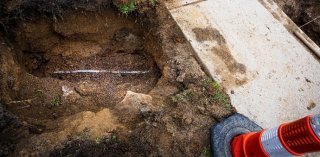Bipartisan Infrastructure Law Webinar
About the Webinar

1. EPA Water Technical Assistance Opportunities
All communities deserve access to safe, clean, and reliable water. Yet too many communities across America—rural, urban, and suburban, small and large—face challenges in providing safe drinking water, wastewater, and stormwater services to their residents. EPA's free water technical assistance supports communities to identify water challenges; develop plans; build technical, financial, and managerial capacity; and develop application materials to access water infrastructure funding. This webinar highlights EPA’s water technical assistance opportunities and how to request assistance.
Presenter: Bev Vazquez, EPA's Office of Water. Bev is an environmental protection specialist in EPA’s Office of Water, Water Infrastructure and Resiliency Finance Center with over seven years of experience in the government water finance sector. They has experience in providing technical assistance to a varied audience and has led projects related to water technical assistance, affordability, water infrastructure funding, stormwater, and agricultural issues.
2. Supporting the Selection and Implementation of Technologies to Remove PFAS from Drinking Water and from Treatment Residuals
EPA is initiating a program designed to support public drinking water systems as they select and implement technologies to remove PFAS from drinking water and from drinking water treatment residuals. A major portion of this effort involves partnering with water systems to provide piloting, sampling, analytical, and optimization support. This assistance can be provided for pilot-scale, temporary full-scale, or recently installed full-scale permanent treatment units. This webinar highlights this program and how the information gained from these interactions will be used to assist the partner systems and to develop case studies, treatment performance models, and cost models that will be freely accessible to systems nationwide with similar water qualities.
Presenter: Nicholas Dugan, P.E., EPA Office of Research and Development. Nick is an environmental engineer in EPA’s Office of Research and Development, Center for Environmental Solutions and Emergency Response. He has over 25 years of experience conducting research on the removal of microbial and chemical contaminants from drinking water. Nick is licensed as a professional engineer in Ohio.
3. Applied Research and Technical Assistance Project on Lead Service Line Identification Technologies
EPA has initiated research to evaluate commercially available and emerging technologies that can be used by communities to determine where lead service lines are located. This project is intended to fill data gaps related to technology performance, accuracy, costs, and ease of use, and help communities move toward the goal of removing all lead pipes across the United States over the next decade. This webinar highlights this effort and how researchers will develop the information and tools needed by states, Tribes, and public water systems to select and implement technologies that rapidly identify LSLs, build accurate inventories, and cost-effectively leverage available Drinking Water State Revolving Fund monies authorized under the Infrastructure Investment and Jobs Act to replace them.
Presenter: Darren Lytle, Ph.D., P.E., EPA's Office of Research and Development. Darren is an environmental engineer with EPA’s Office of Research and Development, Center for Environmental Solutions and Emergency Response. Since he began work at EPA in 1991, he has investigated and published numerous work on drinking water systems, including distribution system corrosion control and water quality (e.g., lead and copper corrosion control); filtration (emphasis on removal of particles, and microbial contaminants and pathogens from water); biological water treatment; and iron and arsenic removal.
